Falling behind
TEACHER COMPENSATION AND THE RACE AGAINST INFLATION



Driven to change the fact that Mississippi has historically been last, our founders set a bold vision: a Mississippi first in education nationally. Mississippi First champions transformative policy solutions ensuring educational excellence for every Mississippi child. We are a leading voice for state-funded pre-K, high-quality public charter schools, access to highly effective teachers, and rigorous state learning standards and materials.
Mississippi First extends special thanks to the 909 educators who completed the 2022-2023 Mississippi Teacher Survey. Mississippi First worked with the Survey Research Laboratory (SRL) at Mississippi State University’s Social Science Research Center as part of this project. SRL sent out the survey via email according to our specifications and provided the data to us at the close of the survey. Mississippi First completed all analysis, and SRL does not agree or disagree with any of this analysis or commentary. This report was made possible by the generous support of the W.K. Kellogg Foundation. The views expressed in this report are those of Mississippi First alone.
© Copyright 2023 Mississippi First

Report Photography Credit: Rory Doyle
Proofreader: Sonja Semion
125 S. Congress Street, Suite 1510, Jackson, MS 39201 601.398.9008 • www.mississippifirst.org

a college degree and a career in education was the ticket to avoiding the fate of Cash’s narrator—a life that was all too familiar for the parents and grandparents of so many in Mississippi.
The disconnect between the dream and the reality for teachers is even more painful when put in this perspective: the precarious financial position that many teachers reported in our November 2021 statewide teacher survey sounded devastatingly similar to that of Cash’s “Busted.” Teachers may not have “a cow that went dry” or a “hen that won’t lay,” but an eye-popping 53.6% told us they were thinking of exiting the classroom to afford their “big stack of bills/Getting bigger each day.”
Though alarming, such findings did not come as a total surprise to us. When our first educator pipeline report Nothing in the Pipes revealed a precipitous decline in new teachers, we theorized that the financial viability of the profession could be turning prospective teachers away. The findings in that report led us to advocate a substantial across-the-board raise that would help educators achieve some measure of financial security. Inflation, we told policymakers, will quickly outpace any raise that is too small or too infrequent. The 2021 raise of $1,110 for teachers in their first three years and $1,000 for all other teachers and teacher assistants was a start, but we knew it would not be enough. Imagine how thrilled we were, then, in March 2022 when the legislature voted to send the largest single-year teacher pay raise in history to the governor’s desk. On average, teachers stood to gain over $5,000 in base salary increases. If the emails we received were any indication, teachers were similarly ecstatic: Finally, the raise will be large enough to help us regain solid financial footing.
It’s called a sucker punch exactly because you don’t see it coming.
Double-digit inflation in the summer of 2022 knocked the wind right out of all of us and vaporized most of the value of the pay raise before it could even go into effect, leaving the promise of financial security once again just out of reach for too many teachers. Although we did hear some positive anecdotes about teachers quitting their second jobs as the 2022-2023 school year began, we knew we needed to hear more broadly from the teachers who participated in our original survey. The follow-up survey, administered in November 2022, again asked teachers about their future plans and what factors drive their career decisions, but we also added questions specifically about whether the pay raise had meaningfully changed their financial position.
This report analyzes the results of the follow-up survey, and the findings are dispiriting, to say the least. Teachers are certainly better off than they would have been in the absence of the 2022 historic raise, but they are nowhere near higher ground due to that summer inflation sucker punch. Too many teachers are running a race they can’t seem to win and wondering if they could make a better living outside of the classroom or, as Cash puts it, “Me and my family’s gotta pack up and go/Where I’ll make a livin,’ the Lord only knows/But I’m busted!”
Changing this situation will require a multi-year approach, pairing across-the-board raises with targeted compensation strategies for those teachers most at risk of attrition. This report offers recommendations for the path forward. We look forward to making them a reality.
Rachel Canter Executive Director of Mississippi First
“My bills are all due and the babies need shoes/But I’m busted,” Johnny Cash sings in “Busted,” a song from his 1963 album Blood, Sweat, and Tears written as an ode to the down-on-his-luck American worker.

09. Findings
09. Finding One: Record inflation has largely negated the impact of the 2022 teacher pay raise.
11. Finding Two: About half of teachers continue to report being likely to leave their Mississippi classroom within the next year.
13. Finding Three: Financial insecurity remains widespread among Mississippi teachers, despite the 2022 pay raise.
14. Finding Four: Black teachers and their peers of color continue to report troubling levels of financial insecurity and attrition risk.
16. Finding Five: Financial insecurity remains one of the most reliable predictors of attrition.
18.
19. Priority One: Provide Mississippi teachers with an across-the-board raise that outpaces inflation.
20. Priority Two: Offer targeted compensation and reduce financial burdens for teachers with the greatest risk of attrition.
21.

In
state lawmakers signaled their commitment to addressing Mississippi’s ongoing critical teacher shortage with a quarter-billion dollar investment to raise the average teacher salary by $5,151—a generous 10.8% increase intended to boost recruitment and retention. In many ways, the pay raise could not have come at a more opportune moment: in the 2021-2022 school year, Mississippi had the lowest average teacher salary in the nation, and just over half of educators had expressed in a statewide survey conducted by Mississippi First that they were actively considering leaving their positions.1 These “likely leavers,” as we termed them, were primarily motivated by low pay and had reported widespread difficulty affording basic necessities like housing and healthcare. With inflation heating up, their standard of living was becoming even more precarious, and we feared an exodus of Mississippi teachers.

As researchers of the state’s educator pipeline, Mississippi First wholeheartedly endorsed and advocated the legislature’s plan to promote recruitment and retention by significantly boosting teacher pay in 2022. While we have found Mississippi’s critical teacher shortage to be a complex, multifaceted issue, our research has yielded a consistent throughline: both the perception and reality of substandard compensation continues to force prospective and current teachers alike to consider—and actively pursue—more lucrative professional opportunities outside of Mississippi classrooms.
We were very hopeful that the massive across-the-board raise in 2022 would mark a turning point in the effort to reverse Mississippi’s critical teacher shortage. But a spike in teacher turnover going into the 2022-2023 school year suggested otherwise: after two years of relatively low attrition during the height of the COVID-19 pandemic, data from the Mississippi Department of Education (MDE) revealed that Mississippi school districts, on average, lost nearly 1 in 4 teachers (23.7%) after the 2021-2022 school year. Reflecting the struggle to fill these open positions with qualified teachers, two-thirds of Mississippi school districts were classified by MDE as critical shortage areas in 2022-2023.2
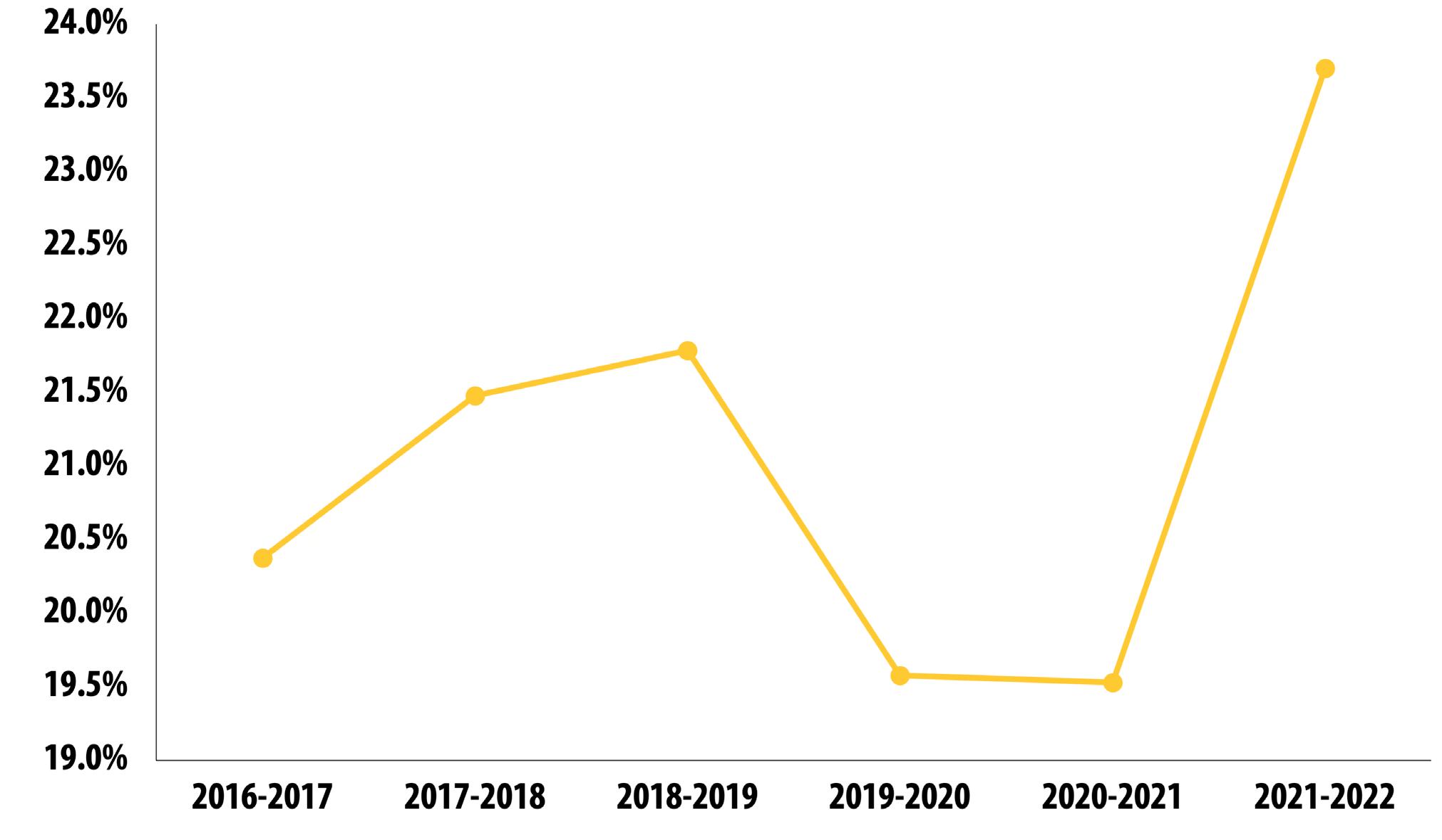
Source: Data provided by the Mississippi Department of Education. Note: Attrition rate for a given year refers to the percentage of teachers not returning to the same district for the following year.
As researchers, we were initially perplexed. This was a level of teacher turnover that we would have anticipated in the absence of a teacher pay raise in 2022. But we soon identified a potential culprit. At the time, we hypothesized that record inflation— which reached its peak at the end of the 2021-2022 school year—was cutting into the economic gains promised by the teacher salary increase, thereby neutralizing any meaningful impact it may have had on recruitment and retention. To test this theory, we turned to a reliable tool: asking teachers themselves.
In December 2021, Mississippi First partnered with the Survey Research Laboratory (SRL) at Mississippi State University to survey 6,496 teachers across the state about their pathway into the profession, financial well-being, career plans, and policy preferences. With about one in five teachers statewide participating, the 2021-2022 Mississippi Teacher Survey became the largest and most comprehensive Mississippi teacher voice data set on these topics in at least the last 15 years. Using this unmatched insight into Mississippi’s educator pipeline, we subsequently released two publications detailing our analyses:
Voices of the Shortage, released in February 2022, offered high-level findings that demonstrated the extent to which Mississippi teachers were prepared to leave their classrooms, largely due to inadequate compensation and a precarious standard of living. This policy brief provided the research base for what soon became the largest single-year teacher pay raise in Mississippi history.

Eyeing
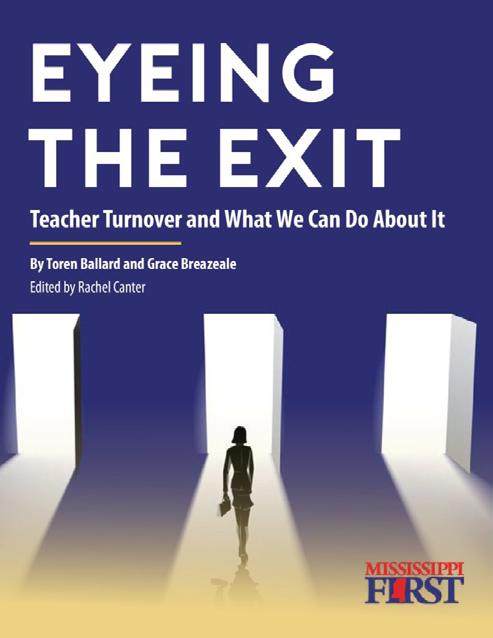
Can Do About It, released in January 2023, provided full results from the 2021-2022 Mississippi Teacher Survey. This deep-dive analysis examined which teachers were at the greatest risk of attrition, further explored the relationship between financial well-being and attrition risk, and offered targeted policy solutions to retain teachers with the greatest likelihood of leaving their Mississippi classroom.
Because a strong association between teachers’ financial well-being and their attrition risk emerged as one of the most salient findings from the 2021-2022 Mississippi Teacher Survey, the confluence of an unprecedented pay raise, historic inflation, and a spike in teacher turnover going into 2022-2023 piqued our interest in conducting a follow-up survey. To make sense of these developments, in December 2022, we again partnered with SRL to conduct the 2022-2023 Mississippi Teacher Survey, which repeats many of the questions of the previous iteration but adds more questions to gauge the impact of both record inflation and a record pay increase. The 2022-2023 Mississippi Teacher Survey garnered a much smaller sample size than the previous year, but with 909 respondents, the resulting data nonetheless provides valuable insights into Mississippi’s educator pipeline.
The comparatively small sample size of the 2022-2023 Mississippi Teacher Survey resulted in estimates that are less precise than ones from the 2021-2022 iteration. As such, fewer of our analyses in this report carry statistical significance. This does not necessarily mean that two values being compared are conclusively similar, just that the sample size is not large enough to determine whether the values are different.
The nature of the survey allowed teachers to respond on a voluntary basis, which can create a risk of self-selection bias. However, we were able to confirm that the demographics of the sample are closely aligned to the population of Mississippi teachers as well as the 2021 survey respondents, which helps mitigate concerns about sampling bias.

In
Mississippi teachers began receiving paychecks according to the state’s updated salary schedule, the result of the largest single-year teacher pay raise in state history. In addition to the yearly step raise for returning teachers, annual salaries increased by an average of $5,151, a 10.8% increase over the 2021-2022 average salary of $47,902.3 But at the same time, the cost of everyday goods and services was rising in similarly record fashion: consumer prices had soared 9.1% over the previous year as of June 2022, the largest annual increase in four decades.4 In December 2022—in this context of both higher wages and inflated prices—we asked teachers about the impact of the 2022 pay raise on their financial wellbeing, as well as the impact of record inflation.
Nearly every teacher (92.9%) responded that inflation had “some” or “a great deal” of impact on their financial well-being. A little over one-third of teachers (36.2%) said the same about the pay raise.
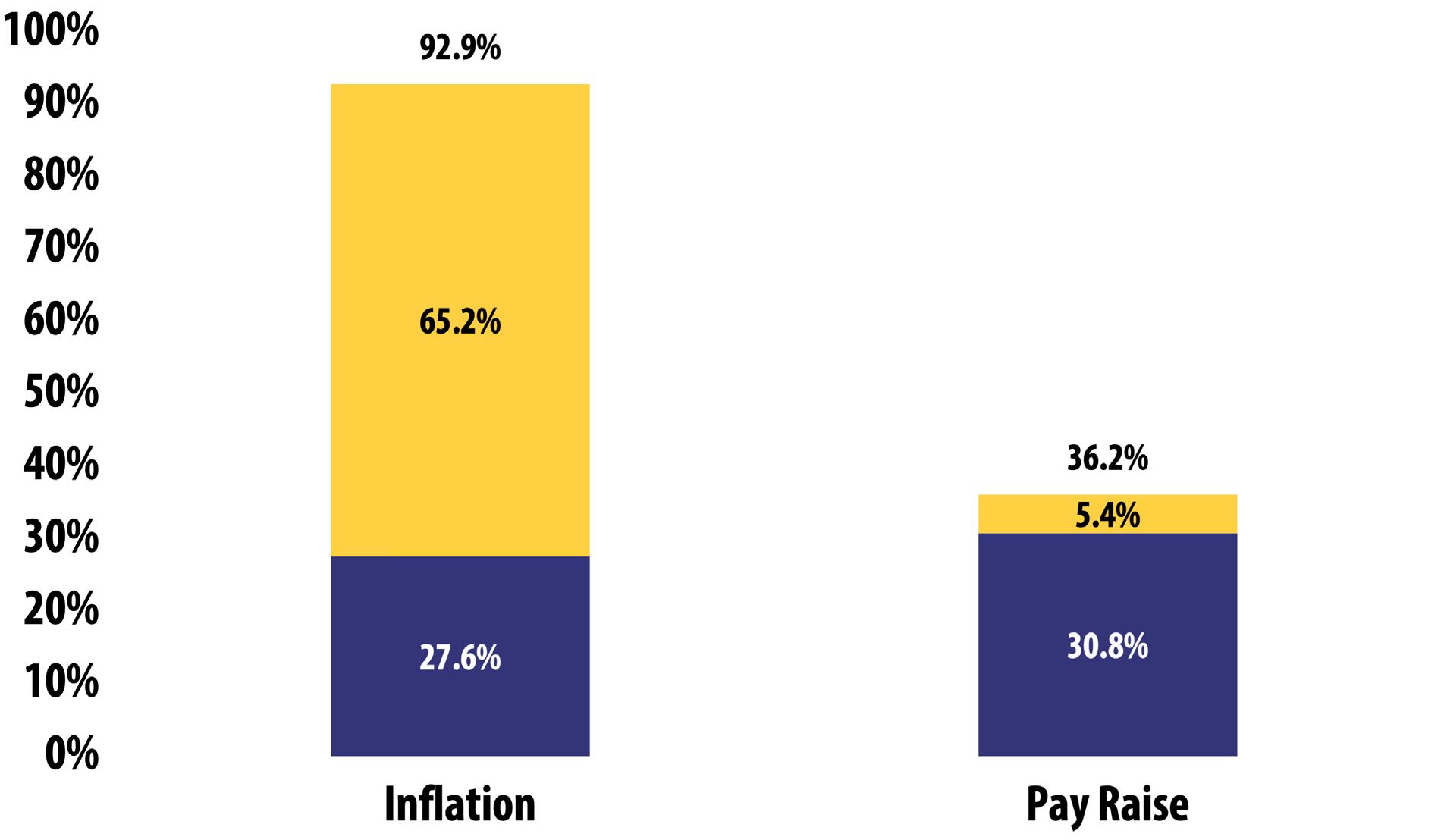
INSIGHT: For most respondents, a seemingly generous 10.8% raise failed to markedly improve their finances because teachers were simultaneously paying more for rent, utilities, food, healthcare, and other basic necessities. This is a familiar story for Mississippi teachers: the average salary may have increased by over $20,000 in the last two decades, but the inflationadjusted value of that salary is currently lower than at any point so far in the twenty-first century (see Figure 3). As survey results make clear, the state’s longstanding inability to improve the purchasing power of a Mississippi teacher salary is having disastrous consequences on teachers’ standard of living and, critically, their willingness to remain in the classroom.
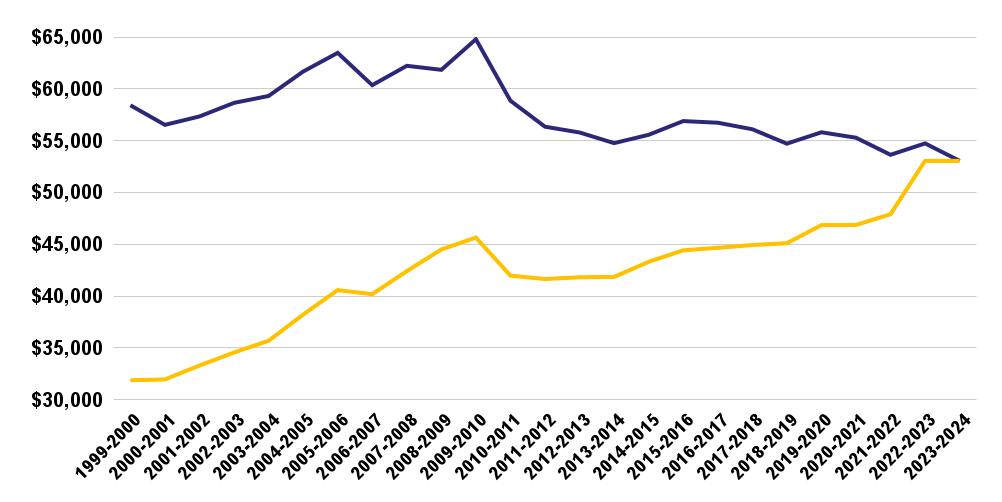
Source: T. Ballard’s calculations based on Mississippi Department of Education’s Superintendent’s Annual Report for the 2012-2013 through 2021-2022 school years, available at https://www.mdek12.org/MBE/SuperintendentsAnnualReport (last accessed August 2023), and the National Center for Education Statistics’ Digest of Education Statistics for the 19992000 through 2011-2012 school years, available at https://nces.ed.gov/programs/digest/ (last accessed August 2023). Average salary for the 2022-2023 school year is estimated by adding the average pay raise for the 2022-2023 school year ($5,151) to the 2021-2022 average salary ($47,902). Without a pay raise in 2023, we assume that the average salary for the 2023-2024 school year remains flat from the prior year. Unadjusted salaries for each year are converted into July 2023 dollars using the Bureau of Labor Statistics’ Consumer Price Index Inflation Calculator, available at https://www.bls.gov/data/inflation_calculator.htm.
The most striking takeaway from the 2021-2022 Mississippi Teacher Survey was that over half (53.6%) of teachers surveyed reported being likely to leave their classroom within the next year. In 2022-2023, we again asked teachers about their likelihood of leaving their current position within the next year to teach out of state, to take a different role in education, or to exit the profession entirely. Teachers were asked these questions separately (e.g., “How likely are you to… leave your current 2022-2023 position within the next year to exit the profession entirely?”) so that they could rate each on a scale from “not likely at all” to “very likely.” As a result, teachers may have indicated they were likely to pursue none of these options, all of these options, or some combination. As was the case in 2021-2022, the results suggest that a significant number of Mississippi teachers are considering an exit.
Over half (52.2%) of teachers surveyed indicated that they are likely to choose at least one of the following exits:
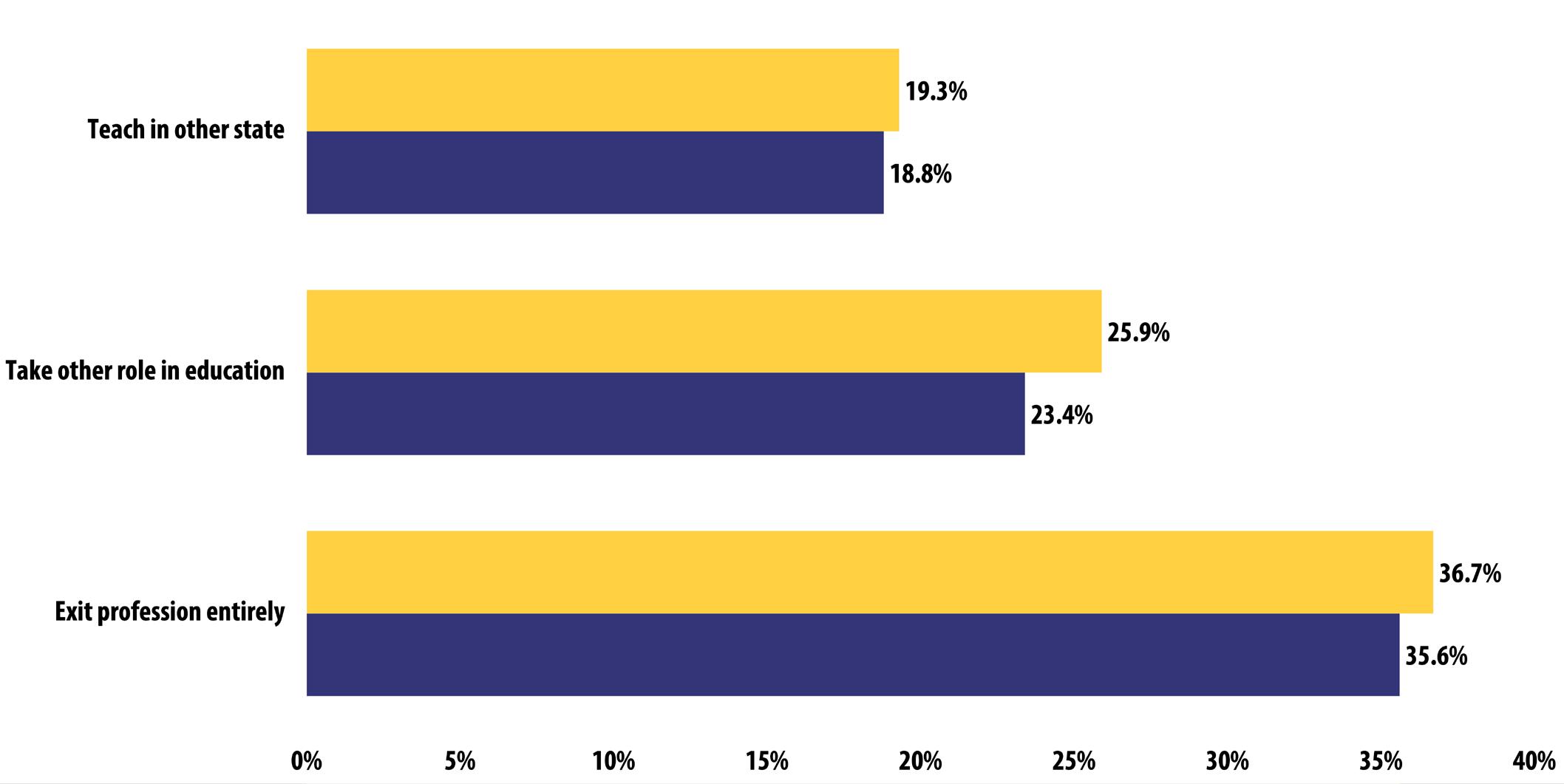
18.8% 35.6% 23.4%
Nearly 1 in 5 teachers reported being “somewhat” or “very” likely to leave to teach out of state.
Nearly 1 in 4 teachers reported being “somewhat” or “very” likely to take another role in education.
Over 1 in 3 teachers reported being “somewhat” or “very” likely to exit the profession entirely.
The proportion of “likely leavers”—our term for teachers who report being “somewhat” or “very” likely to leave their Mississippi classroom within the next year—remains virtually the same (52.2%) as the previous year (53.6%). While there are slight proportional differences between the 2021-2022 and 2022-2023 iterations of the survey, none are statistically significant.
INSIGHT: The 2022 teacher pay raise was intended to promote the recruitment and retention of Mississippi teachers, an approach that appears to be falling short given this level of selfreported attrition risk. But the impact of a salary increase must be understood in the context of its purchasing power: in short, we cannot expect a 10.8% raise to meaningfully influence behavior—in this case, reduce attrition risk and improve retention—when the price of goods and services has risen at nearly the same rate.
In 2021-2022, half of teachers reported that they struggle to afford basic necessities—a key indicator of financial well-being that was linked with attrition risk. We again asked teachers about their ability to meet these fundamental expenses—food, housing, healthcare, etc. Many teachers clearly remain in dire economic straits:
Note: Data based on the percentage of all teachers responding “disagree” or “strongly disagree” to the statement, “My household income is sufficient to afford…”
The student loan payment category only includes respondents with student loans, and the childcare category only includes respondents with children.
One of the lone positive developments in the 2022-2023 Mississippi Teacher Survey is that teachers were less likely to report difficulty affording transportation and housing than the previous year, if only by a few percentage points. It is difficult to determine a precise explanation here, but this could be the result of a nationwide trend of increased savings from the first year of COVID-19 being used as down payments on these longer-term expenses.5 On the flipside, teachers with children were much more likely to report difficulty affording childcare in 2022-2023 than in 2021-2022. This expense obviously does not apply to all teachers, but it represents a troubling continuation of disproportionate financial insecurity faced by teachers with children that we identified in 2021-2022.
Overall, teachers’ standard of living has remained largely stagnant—and precarious. In addition to difficulty affording basic necessities, teachers again reported troubling levels of student debt and reliance on second jobs:
51.7% 47.5%
Roughly half of teachers reported that they work additional jobs inside or outside of education.
Almost half of teachers reported currently having student debt, including 19.7% with a balance of at least $50,000 and 9.1% with at least $100,000.
INSIGHT: Teachers’ ability to afford certain basic necessities may have shifted marginally from 2021-2022 to 2022-2023—either favorably or unfavorably, depending on the metric—but, by and large, financial well-being appears unchanged. This further suggests that record inflation has negated the impact of the 2022 pay raise. This is also not a tenable status quo: the bottom line is that teachers are forced to endure a low standard of living as a prerequisite to a career in education. If a relationship continues to exist between the standard of living experienced by teachers and their likelihood of leaving the classroom, Mississippi children will ultimately suffer the consequences.
Some teachers reported unusually high levels of attrition risk on the 2021-2022 Mississippi Teacher Survey: early-career teachers, teachers with advanced degrees, teachers in districts with low accountability grades, and Black teachers and their peers of color were all far more likely to be considering an exit than others. Each of these groups—and to be clear, there was plenty of overlap here—also reported disproportionately high levels of financial insecurity compared to their colleagues, raising serious questions about a lack of upward mobility within Mississippi’s educator pipeline. This year, a much smaller sample size has precluded our ability to identify as many statistically significant differences in attrition and financial well-being, but glaring disparities by race remain.
Black teachers and their peers of color were about 12 percentage points more likely to be considering an exit (60.3%) than their White colleagues (48.0%). This is a larger disparity than in 2021-2022.
* Difference is statistically significant at the p<0.05 level † Only includes respondents who have children at home under the age of 18 †† Only includes respondents who currently have student debt Note: “Inadequate access” refers to teachers who responded “disagree” or “strongly disagree” to the statement, “My household income is sufficient to afford…” We define a “rainy fund” as savings worth three months of expenses.

Financial insecurity was also much more prevalent among Black teachers and their peers of color: 63.5% reported difficulty affording basic necessities (e.g, food, housing, etc.), compared to just under half (49.4%) of White respondents. Student debt was also much more common among teachers of color (69.4%) than White teachers (40.2%), as was the level of student debt: 1 in 4 teachers of color (23.7%) reported a student debt balance of at least $100K, compared to just 3.7% of White teachers.
INSIGHT: Black teachers and their peers of color are integral to Mississippi’s educator pipeline. They are also vastly underrepresented. Research has demonstrated measurable academic benefits stemming from a more diverse teaching workforce—particularly for economically disadvantaged Black male students—but only 30% of current Mississippi teachers are nonwhite, compared to 56.8% of students.6 And while we have recently seen an encouraging increase in diversity within alternate route educator preparation programs (EPPs) in Mississippi, teacher candidates of color still make up just 39% of total EPP enrollment (and only 19% of traditional route enrollment).7
Excessive rates of attrition among teachers of color threatens to further undermine diversity at the K-12 level, as well as contribute to Mississippi’s critical teacher shortage generally.
In our analysis of the 2021-2022
Mississippi Teacher Survey, we found an unequivocal link between financial insecurity and teachers’ willingness to leave their classroom. Working with a much smaller sample size in 2023, we are unable to examine this pattern among particular groups of teachers (e.g., early-career teachers, teachers in lower-rated districts, etc.) with as much precision as we did in 2022, but the overall trend remains the same: when teachers struggle financially, they are more likely to consider leaving their job.

Teachers with student debt are 10 percentage points more likely to have reported attrition risk (57.2%) than teachers without student debt (47.6%).
Teachers with a second job are 12 percentage points more likely to have reported attrition risk (58.1%) than teachers without a second job (45.8%).
Teachers who reported they are “finding it difficult to get by” are twice as likely to have reported attrition risk (68.1%) than teachers who reported they are “living comfortably” (33.0%).
Teachers who reported struggling to afford at least one basic necessity are 24 percentage points more likely to have reported attrition risk (63.0%) than teachers who did not report struggling to afford any basic necessities (39.3%)
Decisions to leave the classroom are, of course, driven by a multitude of factors that vary by individual. But when we asked teachers specifically which factors influence their career plans, compensation—a critical component of financial wellbeing—was clearly the most important.
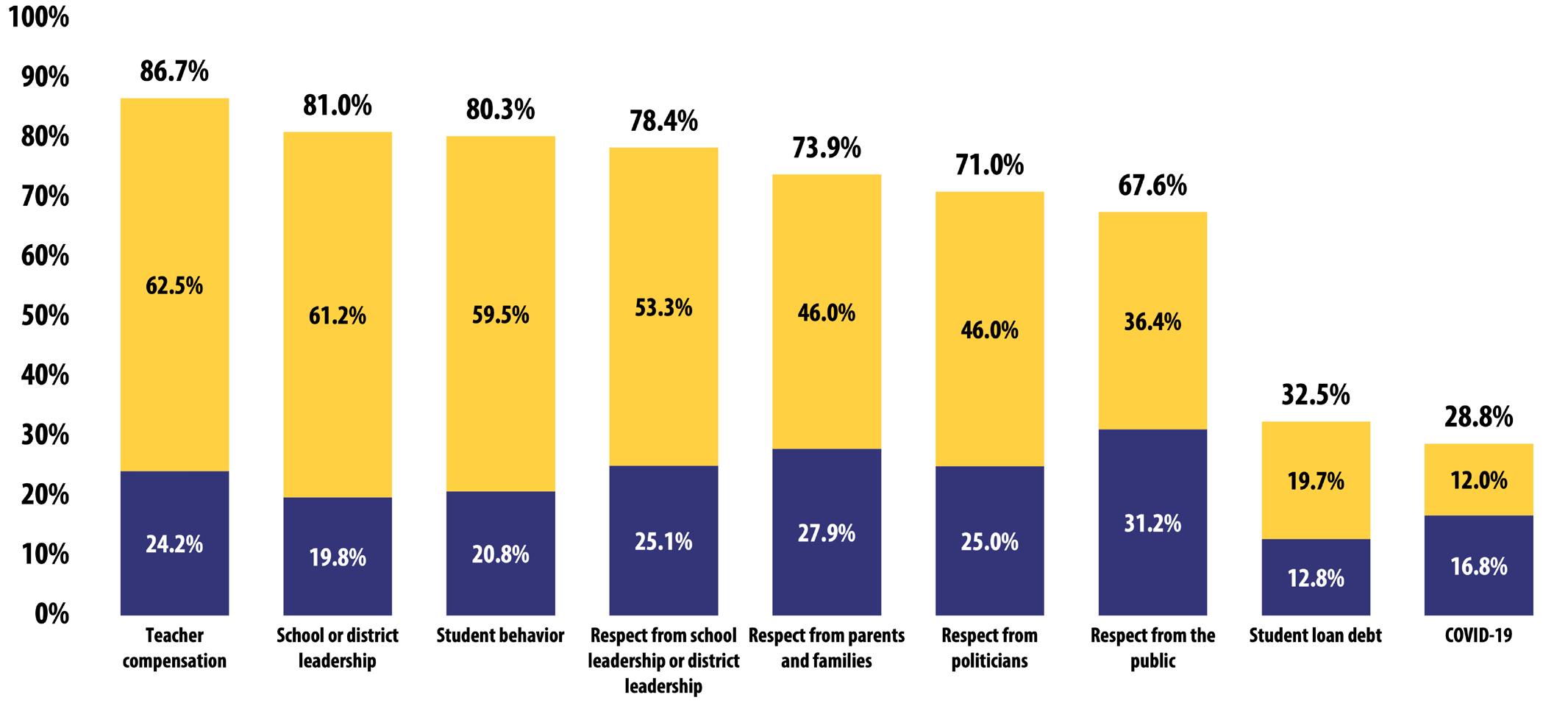
Figure 6 • Whether or not you plan to remain a Mississippi public school teacher, how much of an impact do the following factors have on your career plans?
A great deal
Some
INSIGHT: For two years in a row, survey results have made clear that teachers’ financial well-being is often a prerequisite for their willingness to enter and remain in the classroom. Factors such as school leadership and respect from students are clearly impactful and should not be ignored, but the throughline among “likely leavers” is simply the desire for financial security—security which appears out of reach for many.
The magnitude, persistence, and complexity of Mississippi’s critical teacher shortage will require strategic investment and outside-the-box thinking to support every phase of the state’s educator pipeline (i.e., educator preparation, licensure, recruitment, retention, and retirement). But as we work to understand and improve every facet of Mississippi’s educator pipeline, we should not undervalue the importance of offering Mississippi teachers a standard of living commensurate with their role in educating Mississippi children.
As long as financial insecurity continues to push Mississippi teachers out of the classroom, improving compensation must remain a primary objective. Because there are different avenues through which to bolster compensation, we have developed a series of priorities and related policy recommendations.

for public school teachers does not exist in a vacuum. Even as we begin to move past the recent hyperinflationary environment, the cost of basic necessities will continue to rise and erode the value of a stagnant salary. Every year without a pay raise but with significant inflation is effectively a year with a pay cut for Mississippi teachers. A pay raise equal to the annual inflation rate is a continuation of the status quo. As they did in 2022, policymakers must think big to improve teachers’ financial well-being and enable them to remain in the classroom.
In order to improve the purchasing power of a Mississippi teacher salary, we recommend an across-board-raise of $5,000 for the 2024-2025 school year. Such a raise would increase the starting salary to $46,500 (a 12.0% increase) and the average overall salary to approximately $58,000 (a 9.4% increase). Assuming the current annual inflation rate of roughly 3% will persist for the next year, a raise of this magnitude will modestly improve the purchasing power of a Mississippi teacher salary compared to 2022-2023 (see Figure 7).8
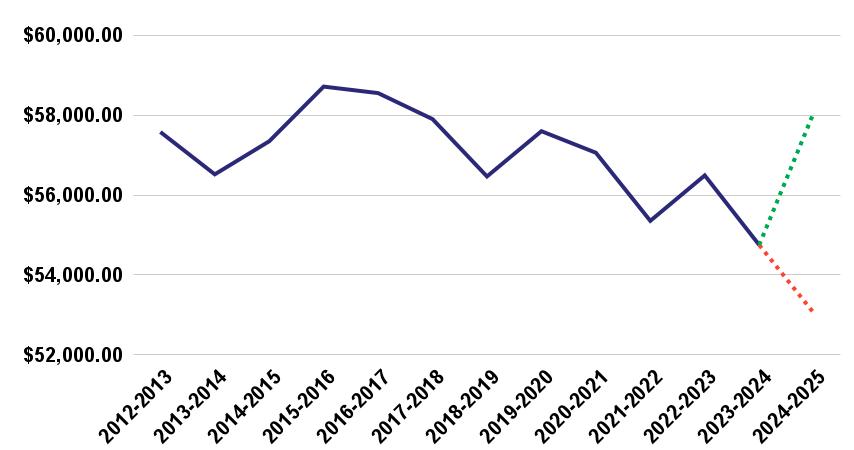
Source: T. Ballard’s calculations based on Mississippi Department of Education’s Superintendent’s Annual Report for the 2012-2013 through 2021-2022 school years, available at https://www. mdek12. org/MBE/SuperintendentsAnnualReport (last accessed August 2023). Unadjusted average salary for the 2022-2023 school year is estimated by adding the average pay raise for the 2022-2023 school year ($5,151) to the 2021-2022 average salary ($47,902). Without a pay raise in 2023, and potentially 2024, we assume that the unadjusted average salary for the 2023-2024 and 2024-2025 school years remain flat from prior years. Unadjusted salaries for each year are converted first into July 2023 dollars using the Bureau of Labor Statistics’ Consumer Price Index Inflation Calculator, available at https://www.bls.gov/data/inflation_calculator.htm, and then adjusted into a projection of July 2024 dollars, assuming the current annual inflation rate of 3.2% persists for the next year. The actual inflation rate may vary.
The massive sample size of the 2021-2022 Mississippi Teacher Survey —with responses from 1 in 5 teachers statewide—allowed us to examine the unique circumstances faced by specific subgroups of Mississippi teachers. Three populations stuck out in particular: teachers in high-need districts with low accountability grades and high attrition rates, teachers with student debt, and teachers with children.
To address the heightened financial insecurity faced by these teachers—and the corresponding increase in attrition risk—we recommended a suite of targeted solutions during the 2022 state legislative session:
ONE TWO THREE
Incentivize teaching in Mississippi’s highest-need areas with an annual critical shortage stipend of $2,000.
Reduce teachers’ student debt burden by expanding eligibility and eliminating the cap on awards for the existing Winter-Reed Teacher Loan Repayment Program.
Increase take-home pay for teachers by lowering state health insurance premiums for teachers with families.
Lawmakers introduced a total of five bills during the 2022 legislative session to achieve these policy goals. None were ultimately signed into law, though in each case the legislation died because of legislative deadlines rather than a lack of votes. In fact, Senate Bill 2585, a bill to expand the Winter-Reed program, passed overwhelmingly in the Senate (40 “yeas” to 8 “nays”) and the House (112 to 6) before ultimately dying when a conference committee failed to produce a final bill before the deadline. Given this level of support, we are hopeful that lawmakers elected in 2023 will favor pushing this legislation to the finish line.
Earlier this year, Arkansas passed the LEARNS Act, a sweeping education reform package that raised the minimum starting salary from $36,000 to $50,000 and provided bonuses of up to $10,000 for teaching in a “high demand” area.9 With the maximum bonus, first-year teachers can now earn nearly $20,000 more in Arkansas ($60,000) than in Mississippi ($41,500). In fact, first-year teachers in Arkansas can now earn more than a Mississippi teacher with 30 years of experience ($58,800).10
Offering a competitive salary is not a one-time investment. In 2022, Mississippi lawmakers agreed to spend $246 million to raise teacher salaries by an average of over $5,000—the largest single-year pay raise in state history. The intent was to recruit new educators, raise teachers’ standard of living, and make a career in Mississippi public schools competitive with other professions and other states.

But the raise came after years of wage stagnation, and the legislature failed to follow up with an additional raise in 2023. In the meantime, inflation has remained high and competition fierce. One year after this historic investment, Mississippi teachers can again cross state lines and likely move into a new tax bracket.
We should not discount the impact of the 2022 pay raise in helping Mississippi teachers break even in the face of soaring prices. With the inflation rate nearing 10% in the summer of 2022, this was not an insignificant feat. Without the raise, Mississippi teachers would have effectively suffered a 10% pay cut. Given the enduring association between financial well-being and attrition, Mississippi’s attrition rate may have been even higher going into 2022-2023 and the impact on schools even more disastrous.
However, without a pay raise this year, teachers have received a pay cut equivalent to the roughly 3% annual inflation rate. Other low-paying states that we may have leapfrogged in 2022—Arkansas, West Virginia, and Florida—raised salaries in 2023, and Mississippi may very well offer some of the lowest teacher salaries in the nation once again.11 But while public schools continue to endure the status quo of uncompetitive, stagnant wages, we learned in 2022 that it does not have to be this way. Lawmakers have previously demonstrated a commitment to making historic investments in Mississippi’s educator pipeline in order to retain veteran educators, attract prospective talent into the field, and improve the quality of instruction for every child in the state. We believe they can do it again.
11 “ICYMI: Governor Ron DeSantis Announces Pay Raises for Florida Teachers,” Florida Department of Education, March 21, 2022, https://www.fldoe.org/newsroom/latest-news/icymi-governor-ron-desantis-announces-pay-raises-for-florida-teachers.stml; Florida Education Association, FEA End-of-Session Report (Tallahassee, FL: Florida Education Association, 2023), https://feaweb.org/wp-content/uploads/2023/05/2023-End-of-Session-Report-web-final.pdf ; “Gov. Justice signs into law 4th state employee pay raise, budget bill, and other legislation,” Office of the Governor, March 17, 2023, https://governor.wv.gov/News/press-releases/2023/Pages/Gov.-Justice-signs-into-law-4th-state-employee-pay-raise,budget-bill,-and-other-legislation.aspx
